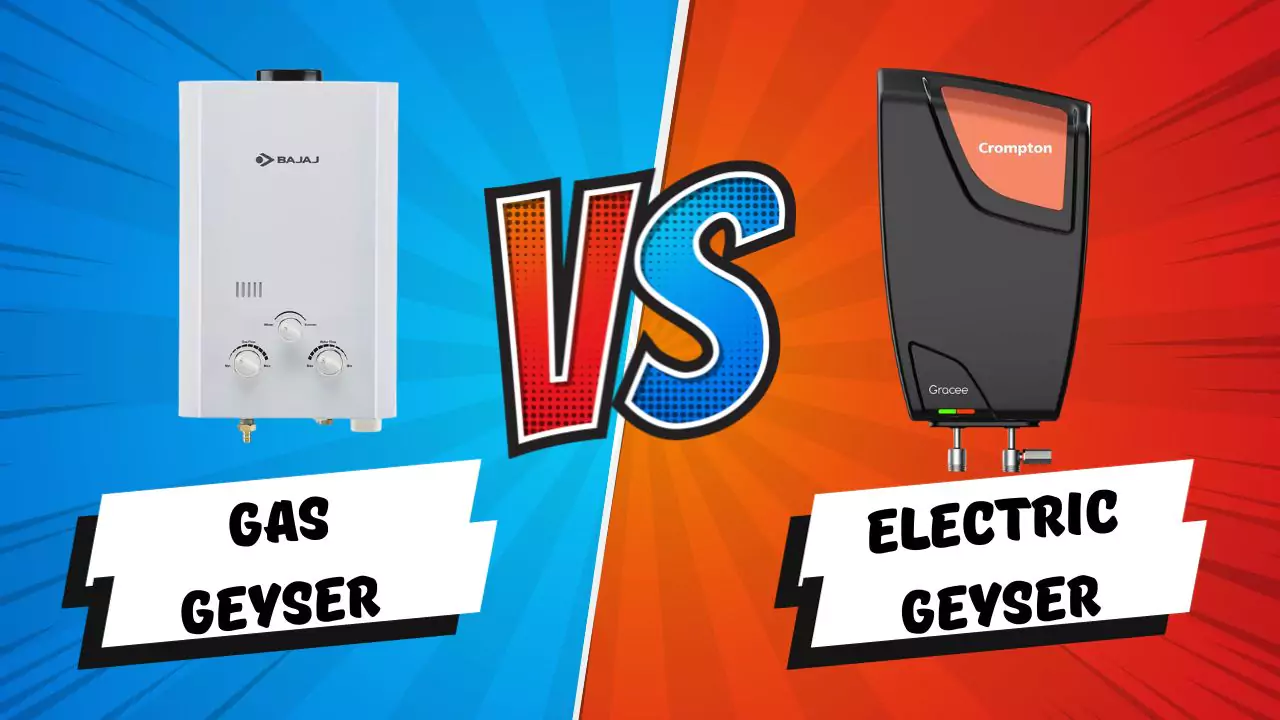
If you’re trying to decide between a gas geyser and an electric geyser, this guide breaks down the differences between these two types of geysers in everyday terms to help you make an informed choice, including which is safer, which performs best, and what sets them apart.
Here’s a comparison table between gas and electric geysers:
| Aspect | Gas Geysers | Electric Geysers |
|---|---|---|
| Efficiency | Fluctuating gas prices, higher energy content | Stable pricing per unit, readily available |
| Family Size | Suitable for larger families | Suitable for various family sizes |
| Maintenance | May require more maintenance | Requires less maintenance |
| Price | Lower cost | Higher cost compared to gas geysers |
| Heating Process | Instant heating | Storage and instant heating capabilities |
| Safety | Requires proper ventilation for gas leaks | Risk of shocks and short circuits |
| Customization | Limited customization options | Offers more customization features |
| Environmental Impact | Emissions during operation | Lower direct impact, can use renewable sources |
| Time | Fast Water Heating | Slow Water Heating |
| Safety | Not very safe (Due to Gas Cylinder) | Extremely safe |
| Life | Less Due to Gas heating burners | Long |
| Installation | Complicated | Easy |
| Space | wall-mounting+ LPG cylinder & proper ventilation More space | wall-mounting Less Space |
Design: Both gas and electric geysers come in horizontal and vertical shapes, but electric geysers tend to be larger in size, while gas geysers are generally slightly smaller.
Capacity: Electric geysers offer a variety of capacity options, whereas gas geysers typically come in 6 or 7-liter capacities.
Use: Gas geysers are typically used for instant water heating, while electric geysers serve both as storage and instant water heaters.
Time: Gas geysers tend to heat water faster than electric geysers. Gas geysers often have a higher heating capacity, allowing them to raise the water temperature more quickly compared to electric geysers. because natural gas has a higher energy content.
Type: Both types of geysers are available in vertical and horizontal designs, so there’s no significant difference in this aspect.
Power Source: Gas geysers use LPG or CNG and a flame to heat water, while electric geysers use electricity and a heating rod or element for the heating process.
Safety: Both types of geysers are generally safe to use, but gas geysers require proper ventilation to address any potential gas leaks, whereas electric geysers pose a risk of shocks and short circuits. Adhering to installation guidelines and regular maintenance helps minimize risks for both types.
Efficiency: Electric geysers are generally more efficient due to stable pricing per unit compared to fluctuating gas prices. Additionally, electricity is more readily available than gas cylinders.
Family Size: For larger families, gas geysers are a better option than electric geysers.
Maintenance: Electric geysers require less maintenance compared to gas geysers.
Price: The price of electric geysers is quite high compared to gas geysers with the same capacity.
Ease of Use: Electric geysers are user-friendly and offer more customization options compared to gas geysers. With gas geysers, the need to reconnect the gas cylinder when it’s empty might be a minor inconvenience for some users.
and the biggest concern is
Which geyser is best, gas or electric?
The choice between a gas or electric geyser depends on various factors aligned with your specific needs. Both types have their advantages. Electric geysers are generally more efficient in terms of stable pricing per unit and offer more size and capacity options, catering to diverse household needs. They also provide greater ease of use and customization features.
On the other hand, gas geysers are smaller in size and ideal for instant heating. They can be more cost-effective in certain regions where gas prices are low and are useful during power outages.
Ultimately, the “best” geyser depends on considerations such as your local utility rates, availability of gas or electricity, your household’s hot water requirements, safety considerations, and environmental concerns. Evaluating these factors according to your specific circumstances will guide you towards the geyser type that best suits your needs.
Related Articles
Conclusion
Electric geysers offer a wider range of features across various segments, making them a preferable choice in most scenarios. They excel in safety features, require lower maintenance, and can be used with renewable energy sources. Considering these aspects, electric geysers often emerge as the superior option for many households.




